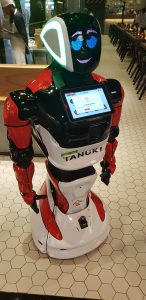Robots and digitals skills in post-pandemic tourism
COVID-19 as a driver of robotisation in tourism and hospitality
The COVID-19 pandemic put serious pressure on tourism and hospitality (TH) companies. Hotels, restaurants, travel agencies, visitor attractions, sports facilities, event centres and other companies had to close their premises for several weeks as part of government measures to curb the spread of the virus. Their financial resources were depleted and some went into default.
While the pandemic created a crisis situation, it provided some opportunities as well. Many TH companies now look at robots as a tool to help them in the (post-)viral world. Most importantly, robots provide a technological shield between the service employees and the tourists, assuring the physical distancing that is necessary to slow down the spread of the virus. In that way, robots help TH companies protect the health of their customers and employees. Of course, robots need to be disinfected after every completed order, but this is a minor concern (and expense) compared to potential losses if the property needs to close due to infected guests/employees. Additionally, robots can help TH employees during the pandemic in measuring the temperature of guests and employees before entering the property, for disinfection with UV light, for provision of information about health procedures etc.
Moreover, service robots improve productivity, efficiency, sales, and service capacity, while at the same time they decrease the fixed costs and the cash outflows of the TH company, thus making it financially more resilient to shocks in demand, compared to TH companies that rely entirely on human employees. Furthermore, COVID-19 challenges the corporate social responsibility claims of many TH companies who were quick to fire employees based on grim sales forecasts. TH companies that use service robots, can serve the same number of customers with fewer human employees. When demand decreases, they can simply turn-off the robots and serve guests by their human employees only. In that sense, the use of service robots decreases the probability that a TH company fires employees when demand decreases and avoids the respective negative publicity that accompanies the firing of people.
Considering the above benefits of service robots, we can expect that COVID-19 will accelerate their adoption by TH companies for room service delivery, provision of information, disinfection of rooms and facilities, carrying luggage, measuring temperature etc.
Digital robotics-related skills for the post-pandemic world
The adoption of service robots by TH companies means that TH employees and managers need respective knowledge and skills. For example, housekeepers need skills on how to operate robots for cleaning and disinfection of rooms and common areas by following a specific protocol. F&B staff needs to be able to operate waiter robots and room service delivery robots but also to take care of their proper and quick disinfection after each delivery. Kitchen staff will work with cooking robots as well. Front Office staff will collaborate with robots for welcoming guests, check-in/out, concierge services, carrying luggage, and other tasks. In museums and art galleries employees will have to be able not only to operate the robots but to update the information about the exhibits stored in the robot’s memory as well. All TH employees in companies that have adopted service robots must be trained to interact and work effectively and efficiently with robots. Such training can be provided in-house, by higher education institutions (HEIs), by robot manufacturers/distributors, consulting companies, training centres, and others.
The required response by HEIs
Currently, no university in the world has incorporated robotics, artificial intelligence, and automation technologies in the curricula of its tourism and hospitality programmes. However, the new technological realities should force HEIs to go beyond the current tourism/hospitality silos and expand the scope of their programmes. HEIs may introduce a separate module on robotics and AI in their undergraduate tourism/hospitality programmes, or even a whole specialization in service robots and AI for hospitality and tourism at Masters level. Classes may be taught by joint teams of tourism/hospitality lecturers and by experts in robotics/AI. The module/specialization doesn’t need to delve deeply into the technical issues of robotics/AI – it needs to provide the technical knowledge and vocabulary students need, and focus on the operational, managerial, economic, social, environmental, and safety issues of the use of service robots in a tourism and hospitality context. For example, students have to learn how to create experiences through service robots, how to evaluate their productivity and economic efficiency, how to manage humans-robots co-working teams, how to address legal issues related to privacy, how to organize processes through robots to protect the health and safety of tourists and employees, etc. This would make future tourism/hospitality managers better prepared for the new technological realities. A step in this direction has already been made – during the 2019/2020 academic year, Varna University of Management (Bulgaria) started a module ‘Technologies in tourism and hospitality’ which was positively received by the undergraduate students.
COVID-19 is driving robotisation in tourism and hospitality. HEIs need to be proactive and prepare students for the (post-)viral world.
By Stanislav Ivanov, Professor, Varna University of Management, email: stanislav.ivanov@vumk.eu, web: http://www.stanislavivanov.com
The opinion piece is based on the following publications:
Seyitoğlu, F., & Ivanov, S. (2020). Service robots as a tool for physical distancing in tourism. Current Issues in Tourism (in press) https://doi.org/10.1080/13683500.2020.1774518
Ivanov, S. H., Webster, C., Stoilova, E., & Slobodskoy, D. (2020, April 3). Biosecurity, automation technologies and economic resilience of travel, tourism and hospitality companies. https://doi.org/10.31235/osf.io/2hx6f
Ivanov, S. (2020). The impact of automation on tourism and hospitality jobs. Information Technology & Tourism 22(2) 205–215. https://doi.org/10.1007/s40558-020-00175-1
Follow the efforts of the Next Tourism Generation via our website, Facebook, Twitter | #NTGskillsalliance or via LinkedIn





No Comments